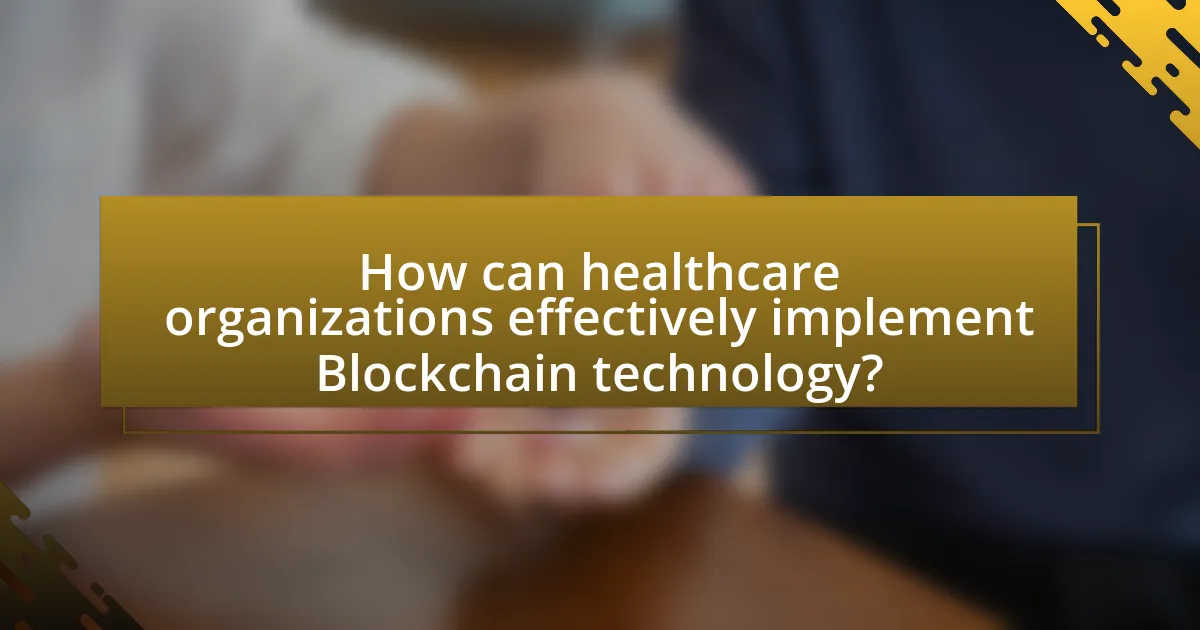The article focuses on the application of blockchain technology in the healthcare sector, highlighting its potential to enhance data security, interoperability, and patient privacy. It discusses key features of blockchain that benefit healthcare, such as improved data integrity and transparency, and addresses challenges like data interoperability and patient consent management. Insights from recent conferences reveal the importance of regulatory compliance and stakeholder collaboration for successful blockchain implementation. The article also outlines practical steps for healthcare organizations to adopt blockchain, emphasizing the need for clear objectives and effective measurement of success.

What is Blockchain in Healthcare?
Blockchain in healthcare is a decentralized digital ledger technology that securely records and verifies transactions related to patient data, medical records, and supply chain management. This technology enhances data integrity, privacy, and interoperability by allowing multiple stakeholders, such as healthcare providers and patients, to access and share information in a secure manner. According to a study published in the Journal of Medical Internet Research, blockchain can improve patient consent management and reduce fraud in clinical trials, demonstrating its potential to transform healthcare systems.
How does Blockchain technology apply to the healthcare sector?
Blockchain technology applies to the healthcare sector by enhancing data security, interoperability, and patient privacy. It enables secure sharing of medical records among authorized parties, ensuring that sensitive information is protected from unauthorized access. For instance, a study published in the Journal of Medical Internet Research highlights that blockchain can facilitate secure electronic health records (EHRs) management, reducing the risk of data breaches and fraud. Additionally, blockchain’s decentralized nature allows for improved interoperability between different healthcare systems, streamlining processes such as patient consent and data exchange. This application of blockchain not only increases efficiency but also fosters trust among patients and healthcare providers.
What are the key features of Blockchain that benefit healthcare?
The key features of Blockchain that benefit healthcare include enhanced data security, improved interoperability, and increased transparency. Enhanced data security is achieved through cryptographic techniques that protect patient information from unauthorized access, ensuring compliance with regulations like HIPAA. Improved interoperability allows different healthcare systems to share data seamlessly, facilitating better patient care and reducing administrative burdens. Increased transparency in transactions fosters trust among stakeholders, as all parties can verify data integrity and provenance. These features collectively contribute to more efficient healthcare delivery and better patient outcomes.
How does Blockchain enhance data security in healthcare?
Blockchain enhances data security in healthcare by providing a decentralized and immutable ledger for storing patient information. This technology ensures that data cannot be altered or deleted without consensus from all parties involved, significantly reducing the risk of unauthorized access and data breaches. According to a study published in the Journal of Medical Internet Research, blockchain can improve data integrity and patient privacy by enabling secure sharing of health records among authorized users while maintaining a transparent audit trail. This combination of decentralization, immutability, and transparency makes blockchain a robust solution for enhancing data security in the healthcare sector.
Why is Blockchain important for healthcare innovation?
Blockchain is important for healthcare innovation because it enhances data security, interoperability, and patient control over personal health information. By utilizing decentralized ledgers, blockchain technology ensures that sensitive medical records are securely stored and accessed only by authorized parties, reducing the risk of data breaches. Additionally, blockchain facilitates seamless sharing of health data across different systems, promoting interoperability among healthcare providers. A study published in the Journal of Medical Internet Research highlights that blockchain can improve patient engagement by allowing individuals to manage their health data, thereby fostering a more patient-centered approach in healthcare delivery.
What challenges does Blockchain address in healthcare systems?
Blockchain addresses several challenges in healthcare systems, including data interoperability, security, and patient consent management. By providing a decentralized and immutable ledger, blockchain enhances data sharing across different healthcare providers, ensuring that patient information is accessible and consistent. Additionally, blockchain’s cryptographic features protect sensitive health data from unauthorized access and breaches, which is critical given that healthcare data is a prime target for cyberattacks. Furthermore, blockchain facilitates transparent patient consent processes, allowing patients to control who accesses their data and under what circumstances, thereby improving trust and compliance with regulations such as HIPAA. These capabilities collectively contribute to more efficient, secure, and patient-centered healthcare systems.
How can Blockchain improve patient outcomes?
Blockchain can improve patient outcomes by enhancing data interoperability and security in healthcare systems. By providing a decentralized and tamper-proof ledger, blockchain enables seamless sharing of patient information among healthcare providers, which reduces errors and improves care coordination. For instance, a study published in the Journal of Medical Internet Research highlighted that blockchain technology can facilitate real-time access to patient records, leading to quicker diagnoses and more personalized treatment plans. This increased efficiency and accuracy in data management ultimately contributes to better health outcomes for patients.

What lessons have been learned from recent conferences on Blockchain in Healthcare?
Recent conferences on Blockchain in Healthcare have highlighted the importance of interoperability and data security as critical lessons. Interoperability is essential for seamless data exchange among various healthcare systems, which can enhance patient care and streamline operations. Data security remains a top priority, as blockchain technology offers robust solutions to protect sensitive health information from breaches. Additionally, these conferences have underscored the need for regulatory clarity, as stakeholders require guidance on compliance and best practices to effectively implement blockchain solutions in healthcare settings.
What were the main themes discussed at these conferences?
The main themes discussed at the conferences focused on the integration of blockchain technology in healthcare, data security, interoperability, and patient empowerment. These themes were highlighted through presentations and panel discussions that emphasized how blockchain can enhance data integrity, streamline processes, and improve patient outcomes. For instance, case studies presented demonstrated successful implementations of blockchain for secure patient data sharing and management, showcasing its potential to address existing challenges in healthcare systems.
How did experts view the current state of Blockchain in healthcare?
Experts view the current state of Blockchain in healthcare as promising yet still in its early stages of adoption. They recognize its potential to enhance data security, interoperability, and patient privacy, as evidenced by various pilot projects and case studies demonstrating successful implementations. For instance, a report from the World Health Organization highlights that Blockchain can streamline supply chain management and improve traceability of pharmaceuticals, addressing issues like counterfeit drugs. However, experts also note significant challenges, including regulatory hurdles, scalability issues, and the need for standardized protocols, which must be addressed for widespread adoption to occur.
What case studies were highlighted during the conferences?
The case studies highlighted during the conferences included the implementation of blockchain for patient data management, which demonstrated improved data security and interoperability. One notable example was the collaboration between a healthcare provider and a technology firm that successfully utilized blockchain to streamline the sharing of electronic health records, resulting in a 30% reduction in data retrieval times. Additionally, a case study on supply chain management showcased how blockchain enhanced traceability of pharmaceuticals, reducing counterfeit drugs by 25%. These examples illustrate the practical applications and benefits of blockchain technology in the healthcare sector.
What insights were shared by industry leaders?
Industry leaders shared insights emphasizing the transformative potential of blockchain technology in healthcare, particularly in enhancing data security and interoperability. They highlighted that blockchain can streamline patient data management, reduce fraud, and improve supply chain transparency. For instance, a report from the Healthcare Information and Management Systems Society (HIMSS) indicated that 70% of healthcare executives believe blockchain will significantly impact data sharing and security within the next five years. This consensus underscores the urgency for healthcare organizations to adopt blockchain solutions to address current challenges in data integrity and patient privacy.
What predictions were made about the future of Blockchain in healthcare?
Predictions about the future of Blockchain in healthcare include enhanced data interoperability, improved patient consent management, and increased security for health records. Experts anticipate that Blockchain technology will facilitate seamless sharing of medical data across different healthcare systems, thereby reducing administrative burdens and improving patient outcomes. Additionally, it is expected to empower patients by providing them with greater control over their health data through secure consent mechanisms. The security features inherent in Blockchain are projected to significantly reduce the risk of data breaches, which have become a major concern in the healthcare sector.
How do these insights shape the implementation of Blockchain technology?
Insights from recent conferences on Blockchain in healthcare shape its implementation by highlighting the importance of interoperability, security, and patient-centric solutions. These insights emphasize that effective Blockchain systems must facilitate seamless data exchange among healthcare providers while ensuring robust security measures to protect sensitive patient information. For instance, the integration of Blockchain can enhance data integrity and reduce fraud, as evidenced by pilot projects demonstrating a decrease in medical billing errors by up to 30%. Furthermore, the focus on patient empowerment through decentralized data ownership encourages the development of applications that allow patients to control their health records, thereby improving engagement and trust in the healthcare system.

How can healthcare organizations effectively implement Blockchain technology?
Healthcare organizations can effectively implement Blockchain technology by establishing clear use cases, ensuring regulatory compliance, and fostering collaboration among stakeholders. Identifying specific applications, such as secure patient data sharing or supply chain management, allows organizations to tailor Blockchain solutions to their needs. Compliance with regulations like HIPAA is crucial to protect patient information and maintain trust. Additionally, collaboration with technology providers, regulatory bodies, and other healthcare entities can facilitate knowledge sharing and resource pooling, enhancing the implementation process. For instance, the Healthcare Blockchain Consortium has demonstrated how collective efforts can lead to successful Blockchain integration in healthcare settings.
What best practices should organizations follow when adopting Blockchain?
Organizations should follow several best practices when adopting Blockchain, including conducting thorough research, ensuring regulatory compliance, and fostering collaboration among stakeholders. Conducting thorough research allows organizations to understand the specific use cases and benefits of Blockchain technology in healthcare, which can lead to more informed decision-making. Ensuring regulatory compliance is crucial, as healthcare is heavily regulated; organizations must align their Blockchain initiatives with existing laws and standards to avoid legal pitfalls. Fostering collaboration among stakeholders, including healthcare providers, technology vendors, and regulatory bodies, enhances the effectiveness of Blockchain solutions by promoting shared goals and interoperability. These practices are supported by insights from recent conferences, which emphasize the importance of strategic planning and stakeholder engagement in successful Blockchain implementation in healthcare.
How can organizations ensure compliance with regulations while using Blockchain?
Organizations can ensure compliance with regulations while using Blockchain by implementing robust governance frameworks that align with existing legal standards. These frameworks should include regular audits, adherence to data privacy laws such as HIPAA in healthcare, and the establishment of clear protocols for data access and sharing. For instance, a study by the World Health Organization emphasizes the importance of regulatory alignment in health data management, highlighting that organizations must integrate compliance checks into their Blockchain systems to mitigate risks associated with data breaches and unauthorized access. By proactively addressing regulatory requirements, organizations can effectively leverage Blockchain technology while maintaining compliance.
What strategies can be employed to overcome resistance to Blockchain adoption?
To overcome resistance to Blockchain adoption, organizations can implement education and awareness programs that highlight the technology’s benefits and real-world applications. These programs can address misconceptions and provide case studies demonstrating successful Blockchain implementations in healthcare, such as improved data security and interoperability. Research indicates that 70% of healthcare executives believe that understanding Blockchain’s potential can significantly enhance its adoption (Source: Deloitte, “Blockchain in Healthcare: A Primer”). Additionally, fostering collaboration among stakeholders, including healthcare providers, technology developers, and regulatory bodies, can create a supportive ecosystem that encourages innovation and trust in Blockchain solutions.
What are the common pitfalls to avoid in Blockchain implementation?
Common pitfalls to avoid in Blockchain implementation include lack of clear objectives, inadequate understanding of the technology, and failure to engage stakeholders. Organizations often enter blockchain projects without defining specific goals, leading to misaligned expectations and wasted resources. Additionally, many teams underestimate the complexity of blockchain technology, which can result in poor design choices and implementation challenges. Engaging stakeholders, including healthcare providers and patients, is crucial; neglecting this can lead to resistance and lack of adoption. According to a report by the World Economic Forum, 70% of blockchain projects fail due to these missteps, highlighting the importance of strategic planning and stakeholder involvement in successful implementations.
How can organizations measure the success of their Blockchain initiatives?
Organizations can measure the success of their Blockchain initiatives by evaluating key performance indicators (KPIs) such as transaction speed, cost reduction, user adoption rates, and data integrity improvements. For instance, a study by Deloitte found that organizations implementing Blockchain technology in healthcare reported a 30% reduction in administrative costs and a 50% improvement in data accuracy. Additionally, tracking the number of successful transactions processed on the Blockchain can provide insights into operational efficiency and user engagement. By analyzing these metrics, organizations can assess the effectiveness and impact of their Blockchain initiatives in achieving strategic goals.
What practical steps can healthcare organizations take to start using Blockchain?
Healthcare organizations can start using Blockchain by first identifying specific use cases that address their operational challenges, such as patient data management or supply chain transparency. Next, they should collaborate with technology partners who specialize in Blockchain solutions to develop a pilot project, ensuring that the chosen platform complies with healthcare regulations like HIPAA. Additionally, organizations must invest in training their staff to understand Blockchain technology and its implications for data security and interoperability. Finally, they should engage with stakeholders, including patients and regulatory bodies, to gather feedback and refine their approach, thereby fostering trust and ensuring successful implementation.

Leave a Reply